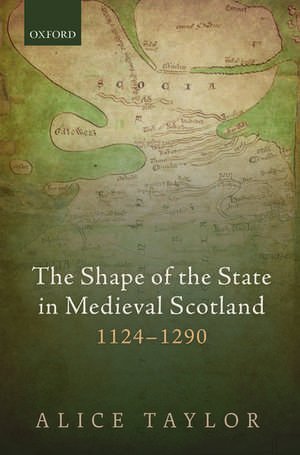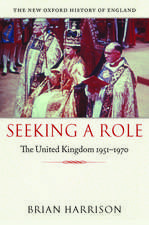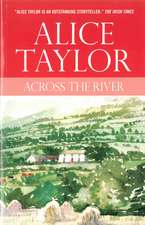The Shape of the State in Medieval Scotland, 1124-1290: Oxford Studies In Medieval European History
Autor Alice Tayloren Limba Engleză Hardback – 3 mar 2016
| Toate formatele și edițiile | Preț | Express |
|---|---|---|
| Paperback (1) | 298.48 lei 10-16 zile | +78.45 lei 6-10 zile |
| OUP OXFORD – 7 mai 2020 | 298.48 lei 10-16 zile | +78.45 lei 6-10 zile |
| Hardback (1) | 708.29 lei 31-37 zile | |
| OUP OXFORD – 3 mar 2016 | 708.29 lei 31-37 zile |
Preț: 708.29 lei
Preț vechi: 812.15 lei
-13% Nou
Puncte Express: 1062
Preț estimativ în valută:
135.53€ • 147.68$ • 114.20£
135.53€ • 147.68$ • 114.20£
Carte tipărită la comandă
Livrare economică 12-18 aprilie
Preluare comenzi: 021 569.72.76
Specificații
ISBN-13: 9780198749202
ISBN-10: 0198749201
Pagini: 550
Ilustrații: black and white maps
Dimensiuni: 162 x 240 x 35 mm
Greutate: 0.94 kg
Editura: OUP OXFORD
Colecția OUP Oxford
Seria Oxford Studies In Medieval European History
Locul publicării:Oxford, United Kingdom
ISBN-10: 0198749201
Pagini: 550
Ilustrații: black and white maps
Dimensiuni: 162 x 240 x 35 mm
Greutate: 0.94 kg
Editura: OUP OXFORD
Colecția OUP Oxford
Seria Oxford Studies In Medieval European History
Locul publicării:Oxford, United Kingdom
Recenzii
In the next generation, all arguments on Scottish governance (and much else) will start from this book.
[Alice Taylor] is to be congratulated and thanked, not only for a remarkable contribution to our knowledge and understanding of medieval Scotland and its systems of government and law, but also for the stimulation which her work will undoubtedly provide.
[A]uthoritative new study....Through a close reading of the surviving source material that challenges several long-held assumptions, Taylor breaks new ground. This book is the culmination of more than a decade of detailed studies by Taylor. It is a challenging work, informed by profound scholarship and a keen sense of purpose. It is sure to lead to considerable discussion and inspire further work in this difficult area of study.
Every generation or so a book is produced that is truly transformative of our understanding of the historical processes that led to evolutionary step changes in the development of a culture or polity. Such is the status of Alice Taylor's magisterial study of the formation of the medieval Scottish state. ... Through Alice Taylor's scholarship we have been presented with a new historiographical horizon; now we need to populate the new landscape with the detail of the new world beyond it.
In this hugely significant and ambitious book, Alice Taylor offers a detailed survey of the developing form of royal government in Scotland during the twelfth and thirteenth centuries... Through rigorous and insightful analysis, Taylor has constructed a vital interpretive model for understanding the dynamics of royal power in Scotland during this period.
The Shape of the State in Medieval Scotland is a work of great scholarship and insight. Through its penetrating analysis of detailed evidence and complex sources, it builds a picture of the gradual development of the state in early Scotland, drawing upon fresh approaches and evidence to yield a textured and nuanced understanding of the growth of royal government in 12th and 13th-century Scotland ... Situating its analysis in a European perspective, it makes an important contribution to the study of medieval kingship, statecraft and the aristocracy. This is a ground-breaking book which will set the terms of debate for many years to come.
This volume represents a truly remarkable scholarly achievement. Without doubt, it is the single most significant work to be published on the Scottish legal system during the central Middle Ages in over 20 years. And yet is does more. Its revolutionary conclusions convincingly explain how the laws of the realm were transformed by shifting power structures in twelfth-century and thirteenth-century Scotland. Furthermore, it achieves this goal in such a way as to demonstrate that the Scottish experience is of great comparative significance.
As another referendum looms, this book comes at an opportune moment to act as a corrective to the co-opting of the medieval past. It is ambitious and thorough; it succeeds in its stated aims, and then some.
The scope of the ground-breaking scholarship displayed by Taylor in this book is remarkable. Through meticulous and rigorous research into extremely difficult manuscript traditions -- which were once described as an 'Augean Stable' of texts by their early-modern editor -- she has recovered much evidence which was previously simply unavailable to Scottish historians.
Alice Taylor is to be congratulated on an outstanding work.
excellent ... a historian with Taylor's rare accomplishments will be able to shed more light on the matter ... So much illumination has already been provided by this remarkable book that to ask for more would be unreasonable
this impressive and timely monograph ... does indeed represent the most significant contribution in a generation to the study of the development of government and law (the 'state' in anachronistic terms) in the emerging medieval Scottish kingdom. Moreover, it must prompt careful reassessment of much of our understanding of the twelfth and thirteenth centuries in that realm and beyond. It is a challenging but undeniably rewarding read on many levels, a model in structure, historiographical context and the layering in and critical evaluation of complex, often seemingly contradictory, records sources (many of them freshly translated and reconsidered by the author).
[Alice Taylor] is to be congratulated and thanked, not only for a remarkable contribution to our knowledge and understanding of medieval Scotland and its systems of government and law, but also for the stimulation which her work will undoubtedly provide.
[A]uthoritative new study....Through a close reading of the surviving source material that challenges several long-held assumptions, Taylor breaks new ground. This book is the culmination of more than a decade of detailed studies by Taylor. It is a challenging work, informed by profound scholarship and a keen sense of purpose. It is sure to lead to considerable discussion and inspire further work in this difficult area of study.
Every generation or so a book is produced that is truly transformative of our understanding of the historical processes that led to evolutionary step changes in the development of a culture or polity. Such is the status of Alice Taylor's magisterial study of the formation of the medieval Scottish state. ... Through Alice Taylor's scholarship we have been presented with a new historiographical horizon; now we need to populate the new landscape with the detail of the new world beyond it.
In this hugely significant and ambitious book, Alice Taylor offers a detailed survey of the developing form of royal government in Scotland during the twelfth and thirteenth centuries... Through rigorous and insightful analysis, Taylor has constructed a vital interpretive model for understanding the dynamics of royal power in Scotland during this period.
The Shape of the State in Medieval Scotland is a work of great scholarship and insight. Through its penetrating analysis of detailed evidence and complex sources, it builds a picture of the gradual development of the state in early Scotland, drawing upon fresh approaches and evidence to yield a textured and nuanced understanding of the growth of royal government in 12th and 13th-century Scotland ... Situating its analysis in a European perspective, it makes an important contribution to the study of medieval kingship, statecraft and the aristocracy. This is a ground-breaking book which will set the terms of debate for many years to come.
This volume represents a truly remarkable scholarly achievement. Without doubt, it is the single most significant work to be published on the Scottish legal system during the central Middle Ages in over 20 years. And yet is does more. Its revolutionary conclusions convincingly explain how the laws of the realm were transformed by shifting power structures in twelfth-century and thirteenth-century Scotland. Furthermore, it achieves this goal in such a way as to demonstrate that the Scottish experience is of great comparative significance.
As another referendum looms, this book comes at an opportune moment to act as a corrective to the co-opting of the medieval past. It is ambitious and thorough; it succeeds in its stated aims, and then some.
The scope of the ground-breaking scholarship displayed by Taylor in this book is remarkable. Through meticulous and rigorous research into extremely difficult manuscript traditions -- which were once described as an 'Augean Stable' of texts by their early-modern editor -- she has recovered much evidence which was previously simply unavailable to Scottish historians.
Alice Taylor is to be congratulated on an outstanding work.
excellent ... a historian with Taylor's rare accomplishments will be able to shed more light on the matter ... So much illumination has already been provided by this remarkable book that to ask for more would be unreasonable
this impressive and timely monograph ... does indeed represent the most significant contribution in a generation to the study of the development of government and law (the 'state' in anachronistic terms) in the emerging medieval Scottish kingdom. Moreover, it must prompt careful reassessment of much of our understanding of the twelfth and thirteenth centuries in that realm and beyond. It is a challenging but undeniably rewarding read on many levels, a model in structure, historiographical context and the layering in and critical evaluation of complex, often seemingly contradictory, records sources (many of them freshly translated and reconsidered by the author).
Notă biografică
Alice Taylor is a Reader in Medieval History at King's College London. She was born in London and studied History at St Peter's College, Oxford. After receiving her doctorate from Oxford in 2009, she was a Research Fellow at King's College, Cambridge until 2011, when she joined the History Department at KCL. The Shape of the State was her first book, and was jointly awarded the Royal Historical Society's Whitfield Prize in 2017. Also in 2017, she was awarded a Philip Leverhulme Prize for History.













